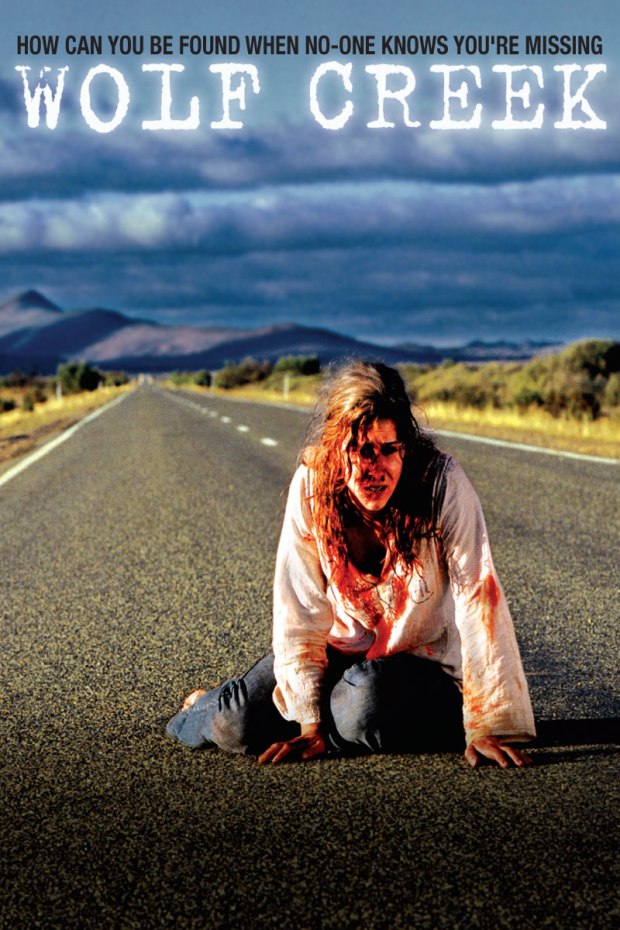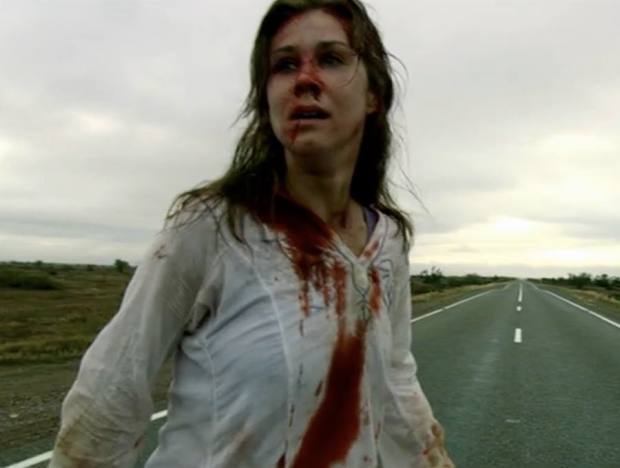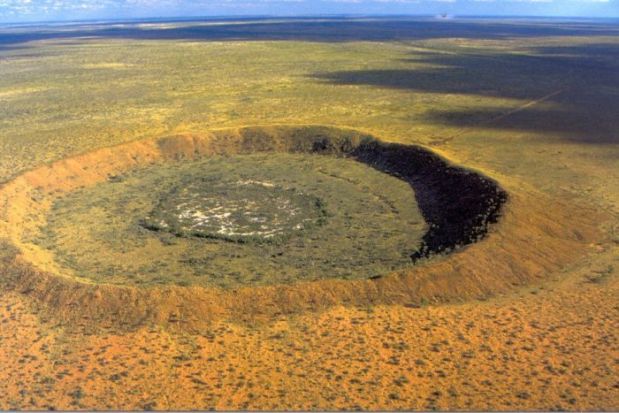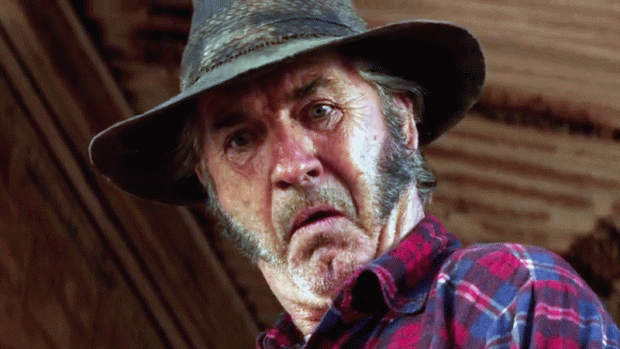Wolf Creek
Australia 2005

When Wolf Creek was seen by critics, the movie created a stink. Roger Ebert watched the film to the end and regretted staying in the cinema. Other critics on American regional newspapers did walk. Condemnation in the USA was coast to coast. Wolf Creek has a couple of unnecessary and unpleasant moments but, compared to normal gore fare, the violence is not excessive. The violence, though, is against women. A male called Ben is crucified but the audience is occupied elsewhere when this happens. Later they see Ben escape from the nails that pin him to planks. If Wolf Creek was given short shift by its enemies, its friends have not helped much, either. The film was welcomed by some because it had ‘grindhouse aesthetics’, which means that it was cheap, nasty and without pretension, not unlike the psychopath that wages war on the tourists.
Director Greg McLean does cheat but this is restricted to the captions in the titles. The opening caption states that the film is loosely based on a true story, and the final captions describe subsequent history for a character that only exists in the film. Mushroom Pictures part financed the film. Perhaps it was their idea that the audience should be kept in the dark.
In Wolf Creek the psychopath lives in an abandoned mining camp. The name of this mining camp is Navithalim, which is the name of Australian serial killer, Ivan Milhat, sort of spelt backwards. Ivan was convicted of killing seven people but the police believe there were more. In prison, Ivan fasted in protest, not because he thought he was innocent. Ivan wanted a PlayStation. No prizes for guessing his favourite games. In another protest Ivan used a plastic knife to cut off one of his fingers. The horror in the Milhat family was not confined to Ivan. His two nephews axed a young man to death. In a separate incident in 2001 Bradley Murdoch murdered British tourist Peter Falconio and assaulted Joanne Lees, the girlfriend of Falconio. This crime and the work of Milhat inspired the film.

The influence of true cases on the film is positive. There are no super heroics in Wolf Creek. Even the psychopath makes mistakes and is vulnerable. In Wolf Creek a trio of limited young people clash with a damaged madman and the consequences are as terrifying as we would expect them to be.
Liz, Christy and Ben want to travel. They want to see the world and think that this will help them celebrate their lives. Liz, Christy and Ben are not likeable. Their claustrophobic lives and dull characters contrast with the infinite space and empty desert around them. They are young people on holiday and are having fun. Even though we may need them, nothing defines our limitations like holidays. We act silly and dress badly. On the site of a giant meteorite crater, Liz and Ben kiss and giggle like children. They are immature and self-indulgent. Liz, Christy and Ben are unaware that their tick list experiences and discoveries will mean little when they are older. The response of the trio to the outback consists of bland trite clichés, one-word comments like ‘wow’ and ‘awesome’. Neither is their appetite for wonder complimented by self-sufficiency and competence. Their walk in the outback is modest and undemanding. Mick Taylor the psychopath is also limited but is able to cope in the outback. He can kill animals and vermin. He knows how to tow the broken car of the trio to the mining camp and is handy for fixing engines.

The journey of the tow truck and the broken vehicle of Liz, Christie and Ben is extended and repetitive but well judged by McLean. He understands the importance of the metaphor. Anyone who has had their car towed by a stranger, even one wearing the uniform of the bona fide RAC, will understand how the experience creates anxiety and disappointment in the self. Trust has to be complete and dependence accepted. Under no circumstances do mechanics share insecurities.
Cars and Jeremy Clarkson are popular because on good days cars provide an illusion of power and strength. Being towed does not happen on good days. The breakdown of a car in a movie heralds chaos and disaster. When Liz returns to the mining camp after escaping Taylor, it is because she needs transport. She is helpless and inferior without a car. She enters a barn and finds it full of the cars of victims. The car has changed from status symbol and no longer insulates against danger. The cars are covered in dust, and there is not a truck amongst them. Removed from consumerist society, like the consumers who owned them, these cars look like coffins in waiting.
One mystery in the film is why the meteoric crater Wolfe Creek was rechristened Wolf Creek for cinema audiences. Maybe the spelling correction is evidence of cultural insecurity. Australia for Britons exists as a consolation and warning. A consolation because Australia is what Britain would be like if there was abundant sunshine, and a warning because climate change means we are already imitating them. Another mystery is the effect of the crater on the watches and car of the trio. The watches stop, and the car refuses to start. If the crater had that effect, nobody would visit the site and Wolf Creek would not be a tourist destination. The incident suggests a supernatural element will shape the story but it does not happen. The incident is superfluous.

The director Greg McLean or his photographer has an eye for nature. The film has stunning images of the Australian landscape. The images are more than pictorial. In Wolf Creek the landscape is mysterious and threatening and has more in common with the sky it touches than the people who walk on the ground. Wolf Creek defines Australia as a country that provides urban coastal settlements and an interior that resists civilisation. When Ben, Christy and Liz meet people in isolated settlements, the locals are as unfriendly and as strange as the reactionaries in Easy Rider. The locals are like the landscape, something to be looked at and photographed and kept at a safe distance. Nations may be defined by boundaries and patriotism but the societies within them are rarely united. Communities coexist and disapprove of the alternatives that the neighbours have created. Taylor the psychopath refers to Sydney as ‘poofter city’. Unpretentious self-effacement is attractive but it is also be a dark veil that hides bigotry and bullying.
The violence of the psychopath that offended critics consists of torture and rape. The escape from the crucifix by Ben is gruesome but not exceptional, and the special effects are modest. The shootings that occur would be suitable for an old fashioned Western. We are aware that there has been prolonged torture and unspeakable acts but more happens than we witness. One scene does shock. The implications are horrific for the victim. It also reveals not just the contempt of violent men for women but how the technical knowledge of practical men can inform their violence. Five minutes were cut from the original film but the longer version has not had theatrical release. The romance of Ben and Liz was edited, and the discovery of a pile of dead corpses was removed. McLean did not want to be guilty of excess.

Despite his sensitivity Wolf Creek is disturbing. Rather than walk out I found it a film where it was impossible to look away. The characters are not likeable but they have possibilities as well as limitations and, though a simple plot, the viewer is not sure what will happen next. John Jarratt is both excellent and repulsive as the psychopath Mick Taylor. He has a scene where his unpretentious charm slips. He puts a zip on his laugh and retreats into silence. The scene has echoes of Joe Pesci losing his sense of humour in Goodfellas but Jarratt, whose quizzical eye does not blink, is more convincing than Pesci. Jarratt looks down his nose at Ben. He is wary and lacking understanding. The strangeness in others will justify for Taylor vindictive violence and not inspire curiosity. The rural psychopath may not have the sophistication of the Patricia Highsmith creation, Tom Ripley. But, although ignorant and confused, he is always competitive. He is more charming, more helpful, more knowledgeable, more amusing and more deadly than those who merely want to survive. As Joseph Conrad almost said, why must some men want to be saints or devils.
Howard Jackson has had four books published by Red Rattle Books. If you are interested in original horror and crime fiction and want information about the books of Howard Jackson and other great titles, click here.
Howard Jackson has had four books published by Red Rattle Books. If you are interested in original horror and crime fiction and want information about the books of Howard Jackson and other great titles, click here.